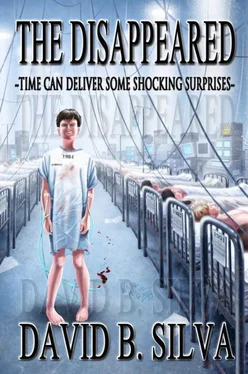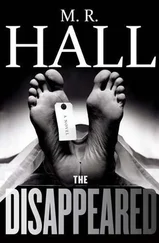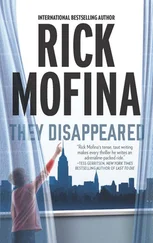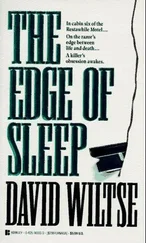“He’s still a little weak,” she said. “But he’ll get stronger.”
His name was Cody, and he was neither nine nor ten. He was eight. After Tilley left, they talked for awhile and he told Gabe that he didn’t remember how he had gotten here, only that he had gone to the park to play. He tried not to cry, but eventually lost the battle, and tears filled his eyes. He missed his mommy, he said. And he didn’t like it here. And he wanted to go home again.
Gabe missed his own mother.
And he wanted to go home, too.
“It’s the same scenario,” Childs said, doodling absently on the calendar pad on his desk. There were two other participants in this meeting. One was a muscle man by the name of Mitch. The other man Childs knew only as D.C., though he suspected this man—who had been his primary contact almost since the very beginning—was a man of many names. They were names you didn’t want to know, because when you started to know too much about these guys, you made yourself dangerous to them, and dangerous men lived short lives.
“What about the others?” D.C. asked.
“What about them?”
“You tell me. Are they all going to start coming up?”
“There’s no way I can answer that.”
Mitch stood in the corner, his arms crossed, leaning against the wall. It was the same position he had taken up every time he had been in this room. He coughed into his hand and crossed his arms again, not saying a word. He had said more than enough already, Childs supposed.
D.C. was perched on the folding table, next to the copy machine. His hands were curled around the edge, elbows locked, knuckles white, and he was swinging his legs through the air as if he were trying to pick up speed. He was not terribly pleased about anything he had heard this afternoon.
“Why not?” he asked.
“I never imagined any of them would wake up,” Childs said.
“Well, they did. And now we’re going to have to figure out what the hell we’re going to do with them, aren’t we?”
“All we need is a little time.”
“How much time?”
“Six months, eight months, maybe a year. Both boys are beginning to show signs of aging. They’ll die naturally if we just wait it out.”
“I’m sure Mrs. Knight won’t mind waiting,” Mitch said.
“She is a problem, doc. No matter what we do.”
“I know,” Childs said, leaning back in his chair. He studied the ceiling, which had a dark gouge over the conference table where two years ago the janitor had crushed a spider under the handle of his mop. “We could transfer the kids to another facility until things settle down. Maybe Houston or St. Charles.”
“The two boys?”
“Yeah.”
“What about the sleepers?”
“We could move them all.”
“How soon?”
“It won’t be easy, not with the sleepers. They’ll need special care. I’d have to make some arrangements.”
“How soon? ”
“Maybe two weeks.”
Mitch grunted. “Like I said, I’m sure Mrs. Knight won’t mind waiting.”
“Then for Christ’s sake just get rid of her!” Childs said, surprising everyone in the room, including himself. For a moment, his entire body shook. He looked away. “I’m sorry. I didn’t mean that. It’s just that…”
“We can’t kill off everyone,” Mitch said.
“I said I didn’t mean it.” He leaned against the desk for support, doing his best to deal with the mix of frustration and guilt roiling up inside him like an angry thunderhead. This had never been the way he had envisioned it. Never. “Amanda Tarkett was more than enough killing for all of us.”
“She was an accident, you son of a bitch.”
“Gentlemen, please,” D.C. said. “Let’s try to stay on subject, all right? We’ve already got plenty on our plate here. No need to toss in the playground insults.”
The pencil Childs had been holding suddenly snapped in half. He stared at the two uneven pieces, the cylinder of graphite exposed beneath jagged yellow edges, then tossed them at the wastepaper basket next to his desk. One piece bounced off the rim and fell silently to the carpet. The other hit home, making a hollow, clanging sound.
“Done?” D.C. asked.
“I hate this,” Childs said.
“I know you do.”
“It’s a fucking nightmare.”
“So let’s see if we can find a way out of it. All right?”
Childs nodded, wearing the lost and lonely face of a man who wasn’t sure of anything anymore.
Teri went into Walt’s bedroom after the manila envelope that had arrived in the mail yesterday. It was sitting where she had left it on the bureau, under the dictionary. She pulled it out, thought about the name at the bottom of the letter – Richard Boyle, and thought how much the bastard must have been enjoying himself. Well, he wasn’t enjoying himself now, was he? She took a deep breath and held it. For a moment, her encounter with Boyle came back to her again, vivid, so fresh that she could smell the alcohol in the air. She had managed to keep it down for two days now, and she had promised herself not to let it up again until long after Gabe was back home and safe.
Teri eased the breath out, and forced her attention back to Walt.
Following the visit to the cemetery, the trip back to the apartment had fallen under the cast of a thick, self-conscious silence. She had witnessed a private moment in the life of a private man, and she had wanted him to know that she understood how difficult his childhood had been. But the moment had never seemed quite appropriate and as soon as they had arrived home, Walt had gone to bed, saying he felt as if he might be coming down with something. He slept through the rest of the afternoon and most of the evening.
Teri found it a little more difficult to sleep. She busied herself with a casserole for dinner—the recipe had been on the back of an elbow macaroni package—and tried not to give too much thought to what had happened. But she had been doing quite a bit of that lately and it was getting more difficult all the time.
Now, standing at the bureau, she wondered for the hundredth time if showing Walt the manila envelope would make matters better or worse. The contents included Xerox copies of old newspaper articles taken from several local newspapers. The articles spanned a period of almost twelve years through the late Fifties and early Sixties. Altogether, they went into a detailed account of Walt’s childhood – his parents’ divorce, how his father had kidnapped him, the towns where they had been spotted, the names they had used, the changes they had made in their appearances. The articles ran all the way through the death of Walt’s mother in 1965, and after that they came to an abrupt end.
What a nightmare, Teri thought.
How could a father do such a thing to his son?
There was one additional item in the envelope, this from only a few years ago. It was a Xerox copy of the minutes of a Board of Supervisor’s meeting dated March 13, 1991. Under the subheading Personnel Matters was a short one-sentence statement highlighted in yellow. It read: With the recommendation of the Police Commission, the employment of Detective Walter L. Travis shall be terminated with full disability pay as of the last day of the last pay period of this month.
He hadn’t quit the department.
They had asked him to leave.
“No,” Walt said, standing at the living room window, looking out across the valley. A thin band of twilight colors edged the distant mountain tops. A few more minutes and nightfall would own the sky. “I didn’t quit. I’m sorry I didn’t tell you, but it’s not the kind of thing a person likes to slip into the conversation.”
Читать дальше












